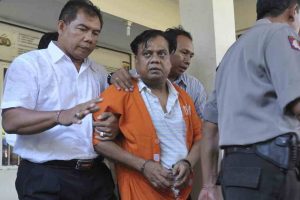Chhota Rajan gets 7 years for passport forgery
 Chhota Rajan, the mafia don captured by Indian police, was produced before Judge Virender Kumar Goyal at the CBI court at Patiala House, New Delhi on April 25.
Chhota Rajan, the mafia don captured by Indian police, was produced before Judge Virender Kumar Goyal at the CBI court at Patiala House, New Delhi on April 25.
He was given a sentence of seven years’ rigorous imprisonment in a forged passport case. A fine of Rs 15,000 was also imposed. This also applied to all three accomplices of Rajan in the case.
The case was brought against Chhota Rajan, aka Rajendra Sadashiv Nikalje, by the CBI.
Arguing for Rajan his counsel Ansuman Sinha prayed for the minimum sentence because “he has three daughters with the third studying in class IX.” The case of Monika Bedi was brought in, where under similar circumstances —forgery of passport—she was sentenced to two years in prison.
The Judge brushed aside these arguments.
—India Legal Bureau
Another Indian biosimilar drug hauled to court
 The international drug brand vs Indian biosimilar drug war has moved into the stroke territory. A practising neurologist, Dr Deep Das, has taken the Central Drug Regulatory Authority to court for approving a drug to treat strokes, manufactured by the Pune-based firm Gennova Biopharma. In his PIL Dr Das alleged that certain safety concerns have not been addressed while the approval was made.
The international drug brand vs Indian biosimilar drug war has moved into the stroke territory. A practising neurologist, Dr Deep Das, has taken the Central Drug Regulatory Authority to court for approving a drug to treat strokes, manufactured by the Pune-based firm Gennova Biopharma. In his PIL Dr Das alleged that certain safety concerns have not been addressed while the approval was made.
The case of this biosimilar drug, Tenectaplase, came up for hearing at the Delhi High Court on April 24.
This is the only company that has secured approval for marketing of Tenectaplase for stroke patients in India. This biosimilar drug’s earning of marketing right has irked Boehringer Ingelheim, a German company, which markets its stroke medicine, called Alteplase. Boehringer has opposed the marketing rights of this biosimilar drug, citing patient safety issue. Dr Das has effectively filed the PIL on this company’s behalf.
The price point, as usual gets the nod for the Indian company. While the German company’s drug costs Rs 73,000 (for a dose), the Indian company markets its drug at Rs 29,000.
In front of the bench headed by Acting Chief Justice Gita Mittal, Dr Das’ claim was that the drug regulator’s approval to the Indian company was not based on ethical grounds. The PIL states that Tenectaplase (of the Indian company) is not recommended by stroke bodies around the world for acute ischemic stroke.
While Gennova Biopharmaceuticals said it had got its approval after trials with over 100 patients and scientific efforts spanning a decade, the German company Boehringer has told doctors that the evidence for the benefit of Tenectaplase in stroke patients is “scanty” and that no “full-fledged, sufficiently powered study”, comparing Tenectaplase with Alteplase has been done anywhere in the world.
The allegation is that the Indian approval is based merely on small, open-label, non-comparative trials.
The Boehringer Ingelheim counsel said: “None of the worldwide stroke bodies including American Stroke Association, European Stroke Organisation, American Academy of Neurology and Indian Stroke Association recommend the use of Tenectaplase for acute ischemic stroke in their guidelines.”
The counsel also said: “No one has approved the molecule for manufacturing of the drug for the disease amnesic stroke. He added there was a collision between Gennova and Boehringer because of the biosimilar medicine has the same molecule called Tenectaplase, but Boehringer sells Tenectaplase under the brand name Metalyse for heart attack patients as a part of a licensing deal with Roche-Genetech.”
The counsel clarified that for strokes the German company sells Actilyse, which is drug alteplase, considered the gold standard in treating the condition. The bench asked several questions to the counsels of petitioner about the procedures laid down in Drug Control Act on the procedures involved in allowing a new drug into the market.
The petitioner said they have to conduct trial in three phases for manufacturing of the medicine and need approval from the central government.
It was also made clear that no new drug can enter the market without adequate scientific trials. Hearings will continue.
—Kunal Rao
SC gives more time to Bru families to present case
The delicate case of the Bru families returning to Mizoram from their Tripura shelter and then losing lives along the way is being heard by the Supreme Court bench comprising Chief Justice JS Khehar and Justice DY Chandrachud.
The Mizoram Bru Displaced Peoples Forum had filed a PIL seeking direction for an independent enquiry into the conditions of the 700 Bru families sent back to Mizoram from 2010 onwards, including the number of families that have died in the transition and thereafter. The PIL also wants the government of India to provide electricity, drinking water, schools, medical facilities and roads to such families residing in Mizoram.
The court has already ordered that those families, who were displaced to Tripura and now were willing to return to Mizoram, should be allowed to do so. The order also said that they should be provided with all facilities that were extended to other Bru families, who were rehabilitated to the state of Mizoram.
The petitioners also wanted more time for more respondents and this too was allowed by the court.
On April 25, the court allowed Central Young Mizo Association and one more organisation to come ahead. Notices were issued to these parties, including Dasti notice.
—India Legal Bureau
Le Meridien case drags on
 The Hotel Le Meridian issue came up for hearing at the Delhi High Court on April 24. The civil suit is about arrears of Rs 13 crore that the hotel group—CJ International Hotels—— has to clear with the NDMC.
The Hotel Le Meridian issue came up for hearing at the Delhi High Court on April 24. The civil suit is about arrears of Rs 13 crore that the hotel group—CJ International Hotels—— has to clear with the NDMC.
The argument that the plaintiff (CJ International Hotels) presented was that its licence agreement with the NDMC, from which it took the land on lease on April 16, 1981, had been modified by a few agreements. The NDMC argues that while the original licence was replaced by another agreement on July 14, 1982, the hotel group already owed NDMC Rs 6 crore by 1989-end.
The plaintiff’s counsel AS Chandok moved an amended application in court on April 24, explaining that certain issues occurred after the suit was instituted and an order was passed, hence it had become necessary. The court, though, saw this as a ploy by the plaintiffs to drag the case on and remained unimpressed.
The plaintiff sought three days’ time to file an amended application that will state matters other than those already stated in the suit. The matter will come up again from May 1.
—Chandan Goswami


